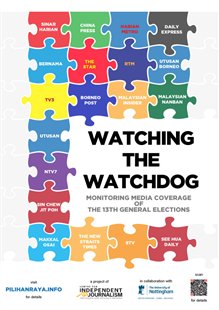
04/05/2013, by CLAS
General Election 13 in Malaysia: The view from UNMC
Following on the success of the University’s Tri-Campus Language Teaching Conference in September, a second gathering of staff working in Modern Languages and Cultures from all three University of Nottingham campuses was held in Malaysia last week. A UK delegation, led by Professor Judith Still, Head of the School of Cultures, Languages and Area Studies, joined the Directors of Languages and International Communications at Ningbo, China, and their Malaysian-based colleagues, to discuss tri-campus initiatives, ranging from new degree programmes in Translation and Interpreting and Area Studies, to enhanced opportunities for international student mobility.
The meetings coincided with campaigning for a general election that has been the most fiercely-contended in Malaysian history and that has radically altered the country’s political culture. Malaysia’s ruling coalition, Barisan Nasional, is the world’s longest-incumbent elected government, holding power since independence in 1957. Recently, however, a new broad-based opposition coalition, Pakatan Rakyat, has challenged this dominance. Having deprived BN of its crucial two-thirds parliamentary majority, and of four of Malaysia’s thirteen state assemblies, in the last election in 2008, PR is now poised for further state assembly gains, and – according to recent polling – could even scrape a parliamentary majority.
A new government would be a momentous change for one of Asia’s most economically dynamic nations. Many older Malaysians remain fiercely loyal to BN as the architects of independence, and as custodians of long-standing peace, inter-ethnic harmony, and economic growth. There is growing dissatisfaction, however, particularly amongst younger, urban voters, regarding government inertia on tackling corruption and cronyism, and on reforming laws and policies decried as authoritarian and racially discriminatory. An end to BN’s hegemony would also resonate with Malaysia’s neighbours, most of whom are either negotiating a gradual transition from single-party authoritarianism to multi-party politics, like Cambodia and Burma, or, like Thailand and the Philippines, are struggling to embed peaceful power transitions within an established multi-party system.
Researchers in the School of Modern Languages and Cultures at the University of Nottingham Malaysia Campus have taken a leading role in analysing the swiftly-changing nature of electoral media coverage. The project ‘Watching the Watchdog: Media monitoring the 13th General Election’, run in collaboration with the Malaysian Centre for Independent Journalism, uses new techniques of qualitative discourse analysis to gauge media performance in its treatment of political figures and parties, as well as key policy issues. Since April 6th, the project’s some seventy media monitors, based country-wide, have analyzed the tenor of election commentary, the access to both state and commercial media that is afforded to different political parties, and the language of statements by the campaigners themselves. A particular focus has been the new on-line media outlets that are increasingly the chosen forum for news and debate amongst Malaysia’s predominantly young electorate, some 22% of whom are first-time voters.
Interim results of the analysis, disseminated on the project website and via Facebook and Twitter, are already impacting on public opinion and political behaviour. Evidence that on-line media offers the most balanced coverage, while state news media have displayed the strongest pro-government bias, has been widely discussed on social media sites and by political pundits and satirists. Meanwhile, in a country that prizes harmony and tact, the standing of current Prime Minister Najib Razak, and of revered former premier Dr. Mahatir Mohamad, has been damaged by their ranking amongst the political figures with the worst record for negative campaigning.
Even while accusations grow that BN is gerrymandering the election, parties across the political spectrum should be congratulated for Malaysia’s slow but steady move away from its authoritarian past. ‘Watching the Watchdog’’s researchers, meanwhile, have proven admirably how much Media & Communications research can contribute to the growth of responsible, balanced and inclusive debate in a young democracy.
For further information, see the ‘Watching the Watchdog’ project website.
Dr Mark Sabine, Spanish, Portuguese and Latin American Studies
No comments yet, fill out a comment to be the first

Leave a Reply